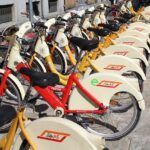The EU-funded, UNIFIER19, project offers commuters a radically new mobility solution that will be “as simple to use as a bus,” according to a statement. Project coordinator Pipistrel Vertical Solutions and its partners “have laid [the] groundwork methodology and tools for multi-objective interdisciplinary design and optimization of a brand-new near-zero-emission regional aircraft concept,” the statement notes. It adds: “Pipistrel’s ambition is to develop and demonstrate a zero emission 19-seat commuter aircraft to provide fully climate neutral aerial mobility in the next decade. By using hydrogen-based propulsion a 100% emission reduction is expected.”
In addition, “the aircraft will present a stepping stone for using zero emission technology on larger platforms such as the Regional and SMR [short/medium range] aircraft.” The UNIFIER19 concept focuses on two scenarios: the miniliner, connecting a potentially large network of small airports, and the microfeeder, providing both scheduled and on-demand shuttle flights from local airports and even unpaved airfields. Pipistrel’s statement adds: “In a future scenario, the 19-seat zero emission aircraft could replace larger conventional/non-zero emission aircraft leading to an increased positive climate impact and improved mobility for EU citizens.”
Miniliner and microfeeder
Pipistrel emphasises that both the miniliner and the microfeeder roles “are conceived as key components in the future development of a more connected European transportation network through enhanced, environmentally sustainable regional air travel.”
In addition to manufacturing an aircraft with “low noise footprint and near-zero impact to the environment,” project partners will focus on developing hydrogen and battery-based propulsion. “The design concept …, as the final project outcome, will be a keystone for enabling Europe’s Flightpath 2050 vision, which envisages that virtually all EU citizens shall reach any continental destination in less than four hours, door to door, by the year 2050.”
The EU’s Flightpath 2050 seeks reductions of 75 % in CO2 emissions, 90 % in nitrogen oxide (NOx) emissions and 65 % in noise levels. The UNIFIER19 (Community Friendly Miniliner) project aims to achieve a reduction in CO2, NOx and acoustic emissions by at least 20 % compared to existing 19-seaters in service. The project will run until March 2022.







Leave a Reply